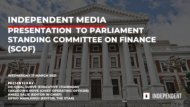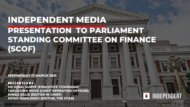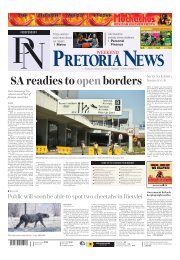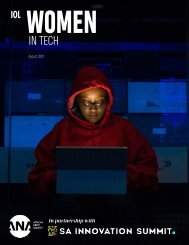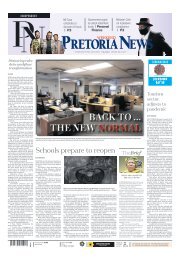Pretoria News Weekend July 11 2020
In these changing times, we have adapted to new ways and this Pretoria News Weekend edition is currently only offered digitally. However, it takes the familiar format of the print edition and has the same mix of news and opinion features, lifestyle and personal finance to keep you informed and entertained. You can download the edition, flip through the pages and zoom into the articles you want to read. For your convenience the puzzles page is available separately for ease of home printing. We welcome your feedback. gautengsubs@inl.co.za
In these changing times, we have adapted to new ways and this Pretoria News Weekend edition is currently only offered digitally. However, it takes the familiar format of the print edition and has the same mix of news and opinion features, lifestyle and personal finance to keep you informed and entertained. You can download the edition, flip through the pages and zoom into the articles you want to read. For your convenience the puzzles page is available separately for ease of home printing. We welcome your feedback. gautengsubs@inl.co.za
Create successful ePaper yourself
Turn your PDF publications into a flip-book with our unique Google optimized e-Paper software.
PRETORIA NEWS | Saturday, <strong>July</strong> <strong>11</strong> <strong>2020</strong><br />
5<br />
A good newspaper,<br />
I suppose, is a nation<br />
talking to itself.<br />
ARTHUR MILLER<br />
American playwright and essayist<br />
ICYMI | IOL.CO.ZA<br />
TRUMP TELL-ALL BOOK<br />
A book by President Donald Trump’s niece,<br />
author Mary L Trump, PhD, describes a<br />
family riven by a traumas, exacerbated by a<br />
patriarch who “destroyed” Donald Trump by<br />
short-circuiting his “ability to develop and<br />
experience the entire spectrum of human<br />
emotion.” See https://bit.ly/TrumpsNiece<br />
OOPINION<br />
CARPING POINT<br />
EDITORIAL<br />
‘Keep the canary<br />
alive in the<br />
coal mine’<br />
KEVIN RITCHIE<br />
@RitchKev<br />
IT WAS brutal this week. Our<br />
economy, already suffering a<br />
nauseating number of unemployed<br />
people, seems to be developing the<br />
same horrible momentum of the<br />
Covid-19 infection rate.<br />
The difference is most of us will<br />
get through the pandemic, not all of<br />
us will survive the economic<br />
contagion.<br />
Media24’s announcement of<br />
newspaper and magazine closures<br />
and the cannibalisation of other<br />
editorial functions provoked the<br />
typical clamour of digital distress.<br />
But all those beating their breasts<br />
should be ashamed of themselves.<br />
Their messages of condolence should<br />
stick in their craw.<br />
Nothing will happen, this is<br />
social media after all: next week will<br />
roll around with a new outrage on<br />
the diary to virtue signal.<br />
Our media is in dire shape. The<br />
coronavirus just took it and gave it a<br />
very hard shake.<br />
This is not a reset, it’s a culling<br />
of the weak in the herd, but there’s<br />
no guarantee who will make it to<br />
the waterhole – or if there’ll even be<br />
water if they get there.<br />
We can blame rapacious owners<br />
draining papers for profit or<br />
reframing news in their own image<br />
and likeness, but the true villains are<br />
the readers themselves.<br />
The media crisis we are living in<br />
now began decades before, when<br />
people stopped reading papers – and<br />
certainly paying for them.<br />
As the eyeballs diminished, so<br />
too did the advertisers until all that<br />
was left was the flotsam and jetsam<br />
of legal notices published under<br />
duress – and the odd, sad sex worker.<br />
Far too many readers stopped buying<br />
papers because they didn’t like how<br />
their echo chambers were being<br />
disrupted – they didn’t like the bad<br />
news, or the stories about people<br />
who didn’t look like them and<br />
certainly didn’t think like them.<br />
Many gleefully reported how they<br />
could get their news for free from<br />
overseas TV channels or from social<br />
media, little understanding that<br />
overseas TV only ever broadcast local<br />
stories when it’s 5-to-catastrophe<br />
while social media is a toxic stew of<br />
fake news, f**kery and fantasy with<br />
lashings of character assassination<br />
and confirmation bias.<br />
Legacy media were often their<br />
own worst enemies, allowing<br />
consultants to lead fearful print<br />
editors and managers by the nose,<br />
evangelising the gospel of clicks,<br />
shovelling the news you’d pay for in<br />
print on to sites for free, squirming<br />
in delight when content went viral<br />
or was “curated” by competitors,<br />
conveniently forgetting that<br />
Facebook “likes” and retweets pay<br />
neither salaries nor the water and<br />
lights.<br />
They blithely ignored the fact<br />
that people won’t pay for papers if<br />
they can get news for free on their<br />
cellphones. The readers didn’t care,<br />
living large on the flush of the<br />
infodemic.<br />
Well, that’s all changing. Another<br />
500 journalists are about to find<br />
themselves on the streets, next to the<br />
thousands of has-beens trying to flip<br />
burgers, peddle insurance or re-write<br />
press releases.<br />
It doesn’t have to get any worse.<br />
Buy your local paper while you still<br />
can, engage with the editors. Hold<br />
them to account.<br />
Make your newspaper, once<br />
again, as Arthur Miller famously said,<br />
“a nation talking to itself”. Keep the<br />
canary alive in the coal mine.<br />
It really isn’t that difficult.<br />
Ritchie is a media consultant and a<br />
former newspaper editor<br />
A DOCTOR talks to a patient at the Coronavirus Unit at United Memorial Medical Center, in Houston, this week. It is important for people with pre-existing ailments to continue taking their<br />
chronic medication during this current health crisis, says the writer. | AP<br />
COMMENT<br />
Comorbidity and Covid-19<br />
DR GLORIA MEMEH<br />
Ensure that those with pre-existing conditions take their chronic medication<br />
FOR EVERY South African, the<br />
Covid-19 pandemic has been a herald<br />
of change, with the deadly plague<br />
creeping into nearly every nation and<br />
state on the planet.<br />
The virus is a red thread that has<br />
been woven into the very fabric of<br />
our being.<br />
We experienced an unprecedented<br />
national lockdown, the likes of which<br />
have never been seen before. Even<br />
after some of the regulations have<br />
been lifted, some now fear the outside<br />
world because of this invisible foe that<br />
we face.<br />
But we cannot allow this fear to<br />
force back the progress we have made<br />
in the fight against chronic ailments<br />
like Tuberculosis and HIV/Aids, which<br />
have long beset our country, and<br />
which remain an issue even during<br />
this time of the corona crisis.<br />
In this time of Covid-19 calamity<br />
when comorbidities may be the<br />
difference between life and death,<br />
taking chronic medication is all too<br />
important.<br />
HIV has has held pandemic status<br />
globally for decades.<br />
In South Africa, it is estimated that<br />
7.6 million citizens are carriers of the<br />
virus, with 4.5 million undergoing<br />
antiretroviral therapy.<br />
During the lockdown, there has<br />
been a 17% decline in viral load tests,<br />
and a consequent decline in HIV testing<br />
and the initiation of antiretroviral<br />
therapy.<br />
According to data from Médecins<br />
Sans Frontières (Doctors Without Borders)<br />
in Khayelitsha on the outskirts of<br />
Cape Town, the initiation of antiretroviral<br />
treatment had halved in March<br />
and dropped by more than 50% in<br />
April.<br />
The implications of these declines<br />
are both stark and grim.<br />
With fewer people starting antiretroviral<br />
therapy and viral load monitoring,<br />
we may see an increase in viral<br />
resistance, a spike in transmissions of<br />
the virus and a surge of life-threatening<br />
co-infections like tuberculosis.<br />
In May, the National Institute<br />
of Communicable Diseases (NICD)<br />
recorded a significant drop in TB testing<br />
since the first day of lockdown in<br />
March.<br />
Before the lockdown, the institute<br />
conducted an average of 47 520 TB<br />
tests every single week.<br />
This plunged to a median of 24 574<br />
tests a week, representing nearly a<br />
halving of tests critical in detecting<br />
and monitoring the disease.<br />
According to their report, the NICD<br />
attributed this to restrictions on movement<br />
and public transport.<br />
Regarding drug-resistant TB, there<br />
has been a massive decrease in case<br />
finding and treatment, figures here<br />
also almost halving during the lockdown.<br />
But while HIV and TB carry a certain<br />
notoriety, chronic diseases like<br />
diabetes cannot be forgotten.<br />
Research conducted by the Human<br />
Sciences Research Council in March<br />
indicates that 13% of South Africans<br />
surveyed were unable to access their<br />
chronic medication during the lockdown.<br />
Of greater concern, the study found<br />
that 13-25% of people living in informal<br />
settlements or rural areas revealed<br />
that their chronic medication was anything<br />
but easily accessible.<br />
These figures should startle, for<br />
the simple fact that comorbidities like<br />
diabetes or high blood pressure are a<br />
harbinger of doom for most of those<br />
who will contract Covid-19.<br />
Make no mistake, South Africa<br />
is dealing with what is arguably the<br />
biggest health crisis in our recent<br />
memory.<br />
This is a war that is waged on many<br />
fronts, and while attention is drawn<br />
to the advance of the coronavirus, we<br />
must take heed of the fact that there<br />
are other threats on the horizon.<br />
These threats have long been an<br />
albatross around our necks and losing<br />
ground in this theatre would be<br />
devastating.<br />
Not only because it sets the scene<br />
for more death and sadness because<br />
of those lost to Covid-19, but that it<br />
renders our sustained effort to eradicate<br />
them completely an exercise in<br />
folly.<br />
While the threat of Covid-19<br />
remains a reality, it has never been<br />
more important for people to take<br />
their medication.<br />
Memeh is a general practitioner based in<br />
Johannesburg<br />
The importance of volunteer-funded research<br />
SIMON ELWEN<br />
CONSERVATION or biological research<br />
projects funded through fees from volunteers<br />
or students are common in<br />
many countries, especially in developing<br />
nations, and on projects working<br />
with charismatic mega-fauna.<br />
“Voluntourism” projects, as they<br />
are sometimes known, often have a<br />
bad reputation as little more than gapyear<br />
holidays for wealthy kids to pet<br />
lion cubs or engage in “white saviour”<br />
fantasies, although core concerns<br />
mainly pertain to projects working<br />
with humans and especially children<br />
(Smith & Font 2015, Freidus 2017).<br />
Although no industry is perfect,<br />
we argue that this approach to project<br />
funding wildlife research projects is<br />
valuable, reasonable, and for many<br />
projects essential.<br />
Although there is considerable<br />
scope within this sector, we focus our<br />
commentary on projects with a scientific<br />
biological research focus rather<br />
than “conservation”, “rehabilitation”<br />
or “community engagement”.<br />
We focus on three marine research<br />
groups within South Africa, the (SSRC<br />
(Social Science Research Council),<br />
Dict (Dyer Island Conservation Trust)<br />
and OR (Oceans Research), although<br />
the arguments apply elsewhere. A<br />
significant amount of the primary<br />
research on marine mega-fauna here<br />
since 2010 has been conducted by<br />
these organisations – all of which are<br />
funded partially by “voluntourism”.<br />
A brief review of publications listed<br />
on these projects websites reveals<br />
69 scientific papers or reports, in a<br />
wide range of international journals<br />
and most with international collaborators.<br />
None of the investigators leading<br />
these projects hold permanent academic<br />
or government research positions<br />
and several were completing<br />
their PhDs over this time.<br />
Funds from volunteers and visiting<br />
students (ie those also doing a thesis<br />
as part of their visit) contribute to<br />
both direct project costs and salaries,<br />
without which many of those 69 contributions<br />
to science (and associated<br />
theses) would likely not exist.<br />
These field focused projects provide<br />
budding scientists with exposure<br />
to field skills and project realities not<br />
easily incorporated into time-limited<br />
and theory-focused undergraduate<br />
courses of 100-plus students.<br />
Project fees are functionally the<br />
same as any university or course fee,<br />
but come with the added bonus of<br />
multiple wildlife experiences, which<br />
if undertaken by the students on commercial<br />
tours, would be substantially<br />
more expensive.<br />
Increasingly, many university<br />
students are required to conduct<br />
internship or extended off-campus<br />
placements as part of their degree,<br />
especially those in the growing number<br />
of course-work based Master’s<br />
degrees available in Europe / UK.<br />
Research organisations can provide<br />
access to long-term data, project<br />
concepts, supervision, field training<br />
and often support students onto their<br />
first publications with limited input<br />
from overworked supervisors at their<br />
home university.<br />
It is only reasonable to charge a<br />
fee for this service. Pro rata, internship<br />
fees are typically less than those<br />
paid for an MSc in the UK which<br />
don’t include accommodation and<br />
food and “optional field courses may<br />
incur additional costs”.<br />
Do paid internships bias “gaining<br />
experience” towards wealthier students?<br />
Yes, but the same argument<br />
applies to any form of tertiary education<br />
that is not free.<br />
Do paid internships take away<br />
opportunities from local or poorer<br />
students or limit job creation? In our<br />
experience, no. In most cases, the<br />
fees generated allow the organisations<br />
to exist, contribute to the salaries of<br />
project members and associated staff<br />
and allow for the support of local<br />
students.<br />
Without these training fees, organisations<br />
such as ours would likely not<br />
exist in their current form. They’d<br />
be smaller, run shorter field seasons,<br />
probably and train far fewer students.<br />
We argue that if research projects<br />
are conducted in alignment with<br />
good academic and ethical standards,<br />
funding from “voluntourism” enables<br />
research, student training and collaboration<br />
opportunities in areas which<br />
would otherwise not exist.<br />
We fully support the promotion of<br />
diversity in science, but caution that<br />
blanket calls to ban unpaid internship<br />
positions or advertisement as they are<br />
“a barrier to diversity and inclusivity”<br />
may be counter-productive outside of<br />
the developed world.<br />
Elwen is the director, Sea Search<br />
Research & Conservation and the<br />
Namibian Dolphin Project and is a<br />
research associate in the Department<br />
of Zoology and Botany at Stellenbosch<br />
University and Mammal Research<br />
Institute at the University of <strong>Pretoria</strong><br />
White<br />
privilege<br />
needs to be<br />
addressed<br />
IF THERE was one thing South<br />
Africa might have been expected<br />
to do over the last 107 days of<br />
lockdown was to think deeply<br />
on the harsh inequality that<br />
Covid-19 has brutally exposed in<br />
this country.<br />
We have many problems, after<br />
more than quarter of a century<br />
as a politically free society,<br />
many of which have their roots<br />
in our fractured and deeply<br />
dysfunctional past.<br />
There is no overlooking this,<br />
getting over it or wishing it away.<br />
Whether it be police brutality<br />
in Alex, the looting of VBS or<br />
state capture as a whole, Black<br />
Lives obviously don’t Matter. It’s<br />
a phenomenon that permeates<br />
beyond there to every aspect of<br />
our society, from the classroom<br />
to the boardroom and the locker<br />
room.<br />
This week South Africa’s<br />
current ODI and T20 cricketer-ofthe-year<br />
Lungi Ngidi announced<br />
his support for the Black Lives<br />
Matter movement and urged the<br />
rest of his Protea teammates to<br />
join him.<br />
He shouldn’t even have to<br />
ask. But some former white,<br />
national cricketers were horrified.<br />
Boeta Dippenaar and Pat Symcox<br />
took Ngidi to task, arguing all<br />
lives matter and urging that the<br />
government act on farm attacks.<br />
They weren’t the only ones.<br />
They miss the point. If all<br />
lives mattered there wouldn’t be<br />
a need to highlight that Black<br />
Lives Matter not just here, but<br />
worldwide.<br />
Farmers’ lives matter too. But<br />
they’re not the only ones getting<br />
murdered in this country, nor are<br />
they the largest group of victims.<br />
Both issues, black lives and farm<br />
murders, need to be addressed,<br />
but both need different solutions.<br />
To conflate the two is neither<br />
logical nor fair. What it does<br />
do, though, is perpetuate the<br />
arrogance of a white privilege<br />
that has never been properly<br />
addressed since 1994.<br />
Until we do this, we will never<br />
truly forge a nation.<br />
Editor<br />
<strong>News</strong>desk<br />
Advertising<br />
Subscriptions<br />
Deliveries<br />
FOUNDED 1898<br />
Valerie Boje<br />
012 300 2107<br />
012 300 2200<br />
0860 326 262<br />
0860 326 262<br />
Mail: PO Box 439, <strong>Pretoria</strong> 0001<br />
E-mail: pta.newsdesk@inl.co.za<br />
Web: iol.co.za/<strong>Pretoria</strong> <strong>News</strong><br />
Facebook: facebook.com/<br />
<strong>Pretoria</strong><strong>News</strong>SA<br />
Twitter: @<strong>Pretoria</strong>news<br />
Instagram: @pretoria.news<br />
PRESS OMBUDSMAN<br />
Complaints relating to editorial content<br />
can be sent to<br />
complaints@inl.co.za<br />
PTA <strong>News</strong> <strong>Weekend</strong> is printed by Insights Publishing,<br />
47 Pixley Ka Isaka Seme Street, Johannesburg,<br />
Gauteng. The copyright in the literary and artistic works<br />
contained in this newspaper and its supplements, as<br />
well as in the published editions and any other content<br />
Or material (including in any online version), belongs<br />
exclusively to Independent <strong>News</strong>papers (Pty) Limited<br />
unless otherwise stated. The copyright, including the<br />
reproduction and adaptation of any content or material<br />
contained in this newspaper and its supplements,<br />
is expressly reserved to the publisher, Independent<br />
<strong>News</strong>papers (Pty) Limited, under Section 12(7) of the<br />
Copyright Act of 1978. The circulation of the <strong>Pretoria</strong><br />
<strong>News</strong> <strong>Weekend</strong> is certified by the Audit Bureau of<br />
Circulations,which can be contacted at PO Box 47189,<br />
Parklands, 2121, South Africa or Suite 5, Ground<br />
Floor, 158 Jan Smuts, 9 Walters Ave, Rosebank, 2196,<br />
Johannesburg. Cover price: R9.50 (includes VAT at 15%)




